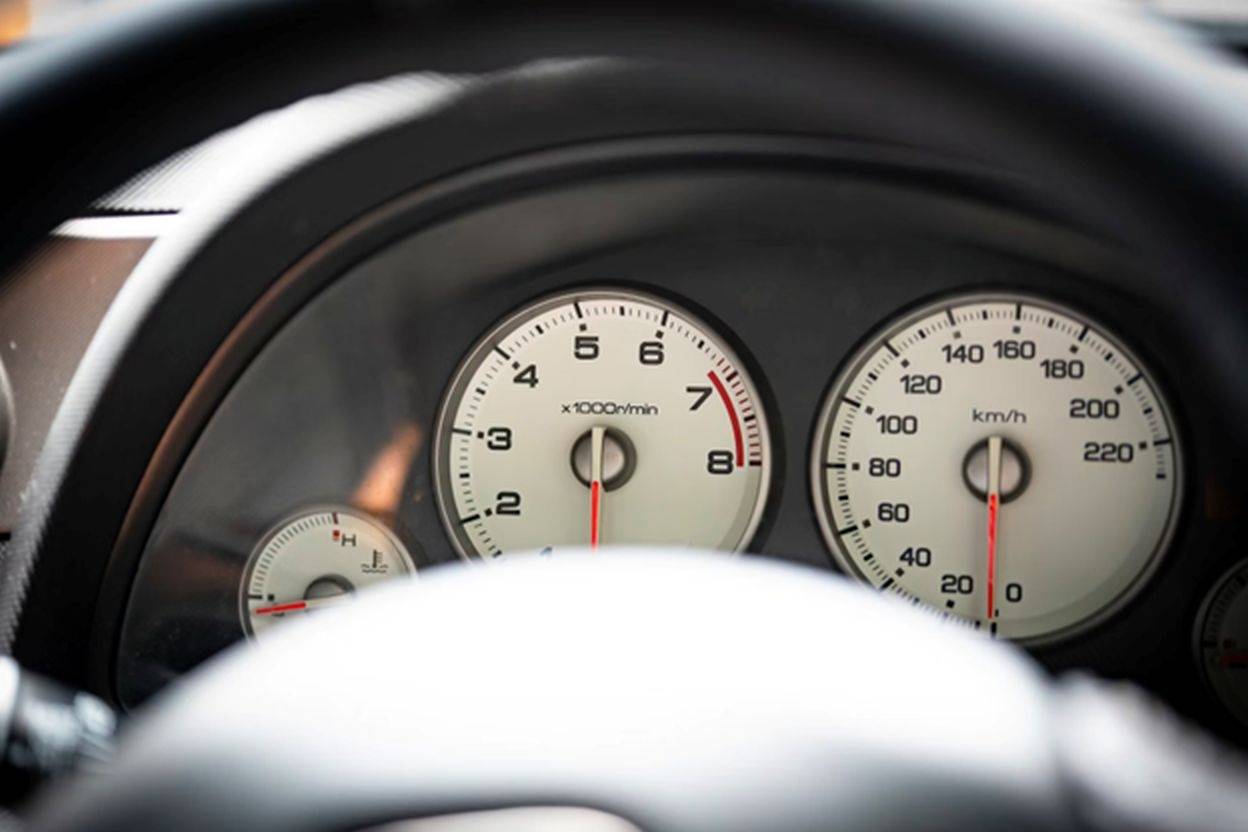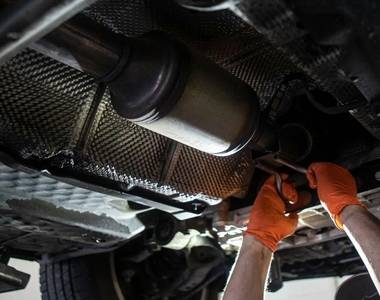When you put your car up for sale, you obviously want to get the most money for it. One of the biggest factors in depreciation is mileage. If you have a car with high mileage, however, that doesn't mean you're out of options.

Learn how to sell a high-mileage car the right way. Discover tips on maintaining value, assessing market dynamics and attracting buyers with enticing ads.
How to Sell a Car With High Mileage

(Source)
In the UK, any car with over 100,000 miles is considered 'high-mileage'. After that much use, many prospective buyers will question its reliability, condition and outlook on future maintenance. They're generally concerned about the need for frequent repairs or lack of resale potential.
Of course, they have every right to be. Buying a second-hand car — especially on the private market — is always riskier than purchasing a brand-new one from the dealer.
In this guide, we'll tell you everything you need to know about selling a high-mileage car, including how mileage impacts value, other factors to consider, and what you need to do to set a fair market price.
At what mileage is it best to sell a car?
Technically, the best mileage to sell your car is zero (or as close to zero as you can get). But it's actually a lot less about the overall mileage of your vehicle and more about its condition and maintenance history.
A car's components don't all wear down at the same time. Each has its own lifespan. And many vehicle components need replacing long before the 100,000-mile mark.
So, a car with high mileage that has been well-maintained can theoretically be in much better condition than a low-mileage vehicle where the owner avoided necessary repairs or hasn't done regular maintenance.
Certain vehicle components are more impacted by mileage than others.
- Tyres need replacing every 20,000 to 30,000 miles. Buyers will closely evaluate the tread of your car's tyres when deciding how much to offer you.
- Brake pads need to be replaced after 40,000 to 50,000 miles. When break pads wear down, they impact your car's ability to stop. That's a huge performance and safety issue.
- Brake discs last twice as long as brake pads. You only need to replace them every 80,000 to 120,000 miles (though it's best to get them looked at periodically as 40,000 miles is a huge margin).
- The clutch needs replacing somewhere between 60,000 and 80,000 miles. If your car can't shift gears correctly, it won't be worth as much.
- Your air filter needs to be replaced every 12,000 to 15,000 miles (or more if you're driving in dusty conditions. Many car owners overlook this basic maintenance, which can lead to poor engine performance.
Let's say your car has 50,000 miles, but you've never changed the tyres and you haven't replaced the battery in three years. When you sell it, your buyer will need to replace these things very soon. So they're buying a car that will cost them a lot more money in the near future.
Even though it isn't specifically 'high-mileage', some of its parts definitely are.

(Source)
Before we dive into the specifics, let's look at a few quick tips for selling a car with high mileage. Some of these are things you should be doing throughout ownership to ensure your car retains as much of its value as possible.
- Get a professional inspection before you sell. Have your vehicle inspected by a qualified mechanic. An inspection will give you and the buyer peace of mind that your car is in good condition, and it might reveal some underlying issues to address before listing the car for sale.
- Document service records. Gather up all service records (including oil changes, brake pads and other repairs), so you can show potential buyers that the car has been properly maintained. This will help build trust and give them confidence in their purchase.
- Consider refurbishing. Depending on your budget, you might want to consider refurbishing certain components of the car — like replacing the tyres or changing out small parts that have reached their end of life.
- Take care of maintenance as soon as the mechanic recommends it. When you take your car to a garage for an MOT or check-up, you might not plan to spend hundreds of pounds. Yes, it's annoying. But don't think you're cutting costs by holding off on getting the work done. All you're doing is devaluing your car.
- Keep parts receipts. When you do replace your car's components, keep all the receipts. Your buyers will want to know the replacement parts are genuine. And they want proof you didn't take it to a shoddy mechanic.
These tips are important for anyone who wants to sell their car, no matter how they sell it. But they are especially important when you're selling a high-mileage vehicle, since maintenance by that point is practically guaranteed.
Understanding the Market Dynamics
Market dynamics play a crucial role in how much you can ask for your car. Before pricing and prepping your car for sale, ask yourself these three questions:
- Is this make/model/year/trim popular in your area? Desirability is the most important factor. Dealers want to buy cars they know they'll drive off the forecourt. Private buyers have their own interests, and you'll find more of them with an in-demand car.
- Are there a lot of similar vehicles on the market right now? This could go one of two ways. Scarcity could help you fetch more for the asking price. Or, it could mean nobody's looking. Consider alternatives alongside your vehicle's desirability.
- Does it have any unusual features or upgrades? Selling a modified car means looking at a different pool of buyers. OEM upgrades improve the value of your car. Other aftermarket upgrades typically don't.
We're going to go out on a limb here and guess you aren't well-versed in up-to-the-minute auto market dynamics. That's why it's best for you to take your car to an authorised garage before you sell. While they look over your car for potential problems, ask for an appraisal.
For a roundabout estimate of your car's worth, start by using our free car valuation calculator. Simply enter your registration number and mileage, then see an estimate in seconds!
Preparing Your Car for Sale

(Source)
Properly preparing your car for sale will help you justify a higher asking price. When interested buyers look at your high-mileage car, they want to see it’s been taken care of and is in good condition.
Here are a few things you can do:
- Clean the exterior and interior thoroughly. Vacuum the carpets, dust off surfaces and wax the bodywork. Better yet, take it to a professional detailer (i.e., the best £200 you'll ever spend).
- Replace worn parts like wiper blades or lights that have gone dim.
- Get the car serviced and up to date on its MOT. Selling a car without an MOT is much more difficult (and, honestly, something that isn’t worth the attempt).
- Replace burned-out bulbs, cracked mirrors or rusty parts. You don't need to go all out with expensive replacements — simply buy whatever looks good enough.
- Polish the paint and fix scuffs/dents in the paint job.
Think of it this way: Would you want to pay a high price for something that looks heavily used? Or would you ask for a lower price simply based on aesthetics?
Most of these fixes are £50 each or less. But they're the difference between your buyers thinking,
- "Wow, this car is in absolutely great shape for its age!"
versus
- "It's a high-mileage vehicle and it shows."
You'll have to do some extra convincing when you sell a high-mileage car no matter what. But, if everything looks pristine, some of its value will speak for itself.
Setting the Right Price
When you price your car for sale, you have to consider where you're selling it and its overall condition. It's an inexact science, and you might find yourself surprised by some of the offers you receive.
If you sell your car privately, you can set a higher asking price. Don't be surprised if you take it to a dealership or submit your info on a car buying site and receive a lower offer.
You also have to be realistic about the condition and age of your car. As a rule of thumb, you should never expect more than half its original value for a high-mileage car. Cars depreciate fast as it is, and high mileage only exacerbates the problem.
Selling a damaged car (or selling a non-running car) will diminish its value significantly. Conversely, a nice-looking one with few or no structural/aesthetic flaws will sell as if it had fewer miles.
To really understand how to set a fair price, check out our comprehensive guide to pricing your car for sale.
Crafting an Effective Advertisement
Most dealers will either look at your odometer and give you an unfavourable offer or turn it away immediately. If you want to get the most for it, your best bet is to sell your car online.
Whether you list it on a classified site (AutoTrader, Gumtree) or a marketplace (eBay Motors, Facebook Marketplace), it all starts with the right ad.
Here are a few tips for creating an ad that gets the right buyers to click:
- Be completely honest about the state of your car. Describe it in detail, including its pros and cons.
- Clearly state it is a high-mileage vehicle if there isn't a separate section for it on the listing.
- Take high-resolution pictures from dozens of different angles, both inside and out. Make sure to accentuate everything that makes it a great car.
- Specify all relevant details about the car, including engine size, transmission type, colour and condition of its tyres, air filter, brake components and other critical parts.
If you're unsure where to place your ad, we have another article where we break down the best websites to sell your car. It includes a recommendation for just about every circumstance.
Transparency About Mileage
An interested buyer will find out about your car's mileage anyway, but upfront transparency will save you a lot of hassle dealing with buyers who aren't interested in a high-mileage car.
When you create your listing, be sure to include all relevant information about its mileage and history, including:
- When it was last serviced
- How often you had the oil changed
- Major and minor repairs done in the past (and by whom)
- Its expected serviceable life and calculated mileage
If your vehicle has high mileage and is also unroadworthy (i.e., it hasn't passed an MOT test or has been declared a write-off), you must explicitly state this. It is a criminal offence to sell an unroadworthy vehicle without letting the buyer know.
Highlighting the Car's Value
Just because your car has a lot of miles on it doesn't mean it's all bad! Especially if it's in working order and has been nicely kept, there's still a lot of value in it.
Highlight the good elements by pointing out features like:
- Low emissions
- Recent upgrades or replacements, such as installing new brakes or tyres
- Fuel efficiency
- A like-new interior
- Low running costs
- A maintenance record indicating regular servicing
Some buyers will see these factors as a reason to buy your car rather than avoid it. They'll see it as a great deal considering the mileage and lower asking price.
Negotiation Strategies
You really have to zero in on the benefits during negotiation. Expect more pushback and scepticism from buyers when selling a car with high mileage.
Here are some common objections and ways to counter them:
- Objection: "This car has a lot of miles on it; why should I pay this much?"
Counterargument: "The car has a lot of miles, but it's in great condition for its age. Since I've recently replaced many of its parts, you'll get great value for your money with all the features and low running costs."
- Objection: "How do I know it won't break down in a few months?"
Counterargument: "This car has been serviced regularly and is up to date on its MOT. These documents certify it's in working order and safe to drive."
- Objection: "I've heard that cars with lots of miles are unreliable."
Counterargument: "High mileage doesn't necessarily mean a car is unreliable — in fact, some of the cars you're looking at with fewer miles are less reliable. It's all about upkeep, and I take good care of my car."
Finalising the Sale
How you finalise the sale depends on the type of buyer you're dealing with. If you're selling your car to a dealership, they will often take care of the paperwork (bill of sale, V5C transfer) for you. If you're taking it to the private market, you handle those things yourself.
Here's a checklist with everything you'll need to do to successfully transfer ownership:
- Settle any outstanding loans (you cannot sell a car on finance in the UK).
- Draw up a bill of sale. Indicate the car was 'sold as seen' with condition and mileage info to protect yourself from liability.
- Give your new owner the 'New Keeper' slip from your V5C logbook
- Tell the DVLA you've sold your car online or by post.
- Cancel your insurance policy (after you've completed the sale)
- Remind your buyer to tax the vehicle before driving it off
Don’t fall for car selling scams. Do not (under any circumstances) transfer ownership or hand your buyer the keys until the money is safely in your account. If you're selling for cash, have it verified at a bank. If it's a bank transfer, wait a few days for it to clear.
Wrapping Up
With the right strategies and a bit of patience, you can get top dollar for your car — even if it's seen better days.
Just remember to be upfront and transparent with potential buyers. Highlight the car's value and features and be prepared to counter objections during negotiation.
By following these tips, selling a high-mileage vehicle can be easy and profitable.
Want to learn more? These are the questions our sellers ask us the most.
At what mileage do cars start having problems?
Somewhere between 30,000 and 50,000 miles, you'll start to see the first real problems with the car. But that all depends on how the car is driven and how well it's cared for. Someone who frequently speeds and slams on the brakes will start having problems with a car earlier than someone who follows the speed limit and brakes gently.
The same goes for maintenance — regular oil changes, tune-ups and other preventive care will help keep a car running smoothly for a lot longer. The mileage of specific components often plays a more immediate role in performance than a car's overall mileage.
Accident history can also play a role in this. There's often unseen damage after collisions that isn't addressed right away. A few years later, that damage can start to manifest itself in mechanical issues.
So, generally speaking, it's not so much about the mileage but rather how well a car has been taken care of. That said, excessive wear and tear will eventually catch up with any vehicle no matter how meticulously it is maintained.
How can I sell a car with over 200k miles?
You can sell a car with 200,000+ miles any way you like. But you have to understand its value will take a huge hit. The best way to maximise the sale price is to gather as much information about the car's maintenance and condition as you can. This will help give potential buyers a better sense of what they're getting for their money.
What is considered a high-mileage engine?
To most, 'high-mileage' means 100,000 miles or more. The average person puts between 12,000 and 15,000 miles on their car every year, so 100,000 miles usually means the car is 8-10 years old. Most engines will last longer than that, but high mileage can cause significant wear and tear on the engine. It's important to properly maintain your car at regular intervals (every 5,000-7,500 miles) to minimise any damage that might occur from excessive use.
Can you reset the mileage on a car in the UK?
There's grey area in UK law regarding whether you can legally change the mileage on your odometer. Altering the mileage on a car is legal. But it is a criminal offence to sell a car with altered miles without explicitly disclosing that to the buyer. Sellers can also be prosecuted if the buyer can prove they marked down the odometer solely to bolster the sale price of the car.










